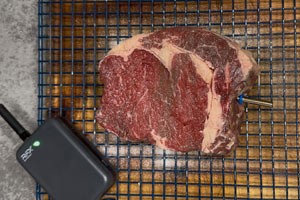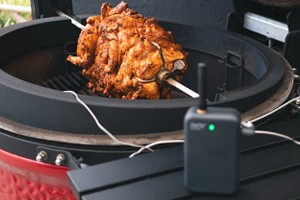Easy, tender BBQ pulled pork, loaded into buns with coleslaw and BBQ sauce.
5 Benefits of Smart Thermometers with Wired Probes
Ask anyone who has purchased a leave-in meat thermometer and they will tell you it's changed their life. Inputting your desired temperature and being alerted when it's done is a game-changer for catching meat at its perfect point.
Like most gadgets, thermometers are moving towards being increasingly smart, connectional and wireless. The two main types of leave-in thermometers seen on the market today are wireless and wire-free thermometers.
Wireless thermometers have a wireless connection to a receiver or smartphone, allowing temperatures to be monitored remotely. The probes are wired, connecting to a unit which sits just outside the oven or BBQ. This allows temperatures to also be monitored from the unit's screen.
Wire-free thermometers are 100% free from wires. All of the smart technology is contained within the probe themselves, and the temperatures are read solely from a smartphone app. Both types of thermometers usually use Bluetooth to send readings to a device, or a combination of Bluetooth and Wi-Fi.
We took a look at the advantages of choosing a smart meat thermometer with a wired probe. We also rounded up our three favourite leave-in meat thermometers.

Benefits of Wired Probes
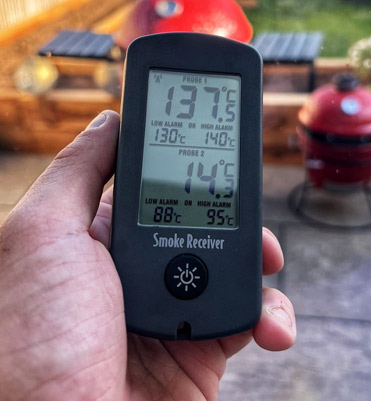
Wide temperature ranges
Because the thermometer's external unit houses all of its wireless technology, wired probes can withstand much higher temperatures. Having a wide range makes these thermometers much more robust, reliable and versatile, especially in harsh BBQ environments.
For wire-free thermometers, if the temperature spikes during a cook it can break the entire unit. This means the whole thing would need replacing. If this were to happen with a wired thermometer only the probe would need to be replaced which is much more cost-effective.
Visual display
You don't always need to go into your phone to check on your food if you're near your oven or BBQ. An external unit means you can simply glance at the display for instant temperature updates, and it has a unique audible alarm that cannot be confused with your regular phone notifications. If your connection fails, it also means you have a backup method for checking your temperatures.
Multiple probe options
Thermometer units are often compatible with up to four removable probes, like the Signals thermometer. This means you can use different probes for different cooks, depending on what you need. For example, you can use a penetration probe with a long lead for your brisket, and a mini needle probe for your ribs.
You can also use an air probe that clips onto your oven shelf or grill grate. It’s really important to monitor your pit temperature, especially for low and slow cooking when you need to keep your BBQ lid closed. Monitoring your meat temperature won’t tell you if your pit temperature is too hot.
Wire-free thermometers also often have an air temperature sensor at one end. However, larger pieces of meat often create a bubble of cool air around them. This means that the temperature close to the meat isn't reflective of the actual oven or pit temperature. Using a wired probe eliminates this problem.
Thin probes
Because wired probes are thinner than wire-free thermometers, they don't make large holes in your food. The Smoke is compatible with a probe just 1.6mm in diameter, perfect for BBQ competitions where you want to avoid unsightly holes in your food.
Thinner probes can be used on smaller pieces of meat and also double as instant-read thermometers. This allows you to check the temperature of your meat all over to ensure it is cooked evenly.
Long Bluetooth range
Wire-free thermometers often have shorter ranges than wired probes, especially if inside a smoker or pellet grill, meaning you can't venture as far while monitoring your cook. They typically have ranges of 50m or less, whereas our Smoke thermometer has a range of up to 91.4 metres. Our Signals thermometer also switches seamlessly between Bluetooth and Wi-Fi, providing continuous signal and real-time alerts wherever you are.
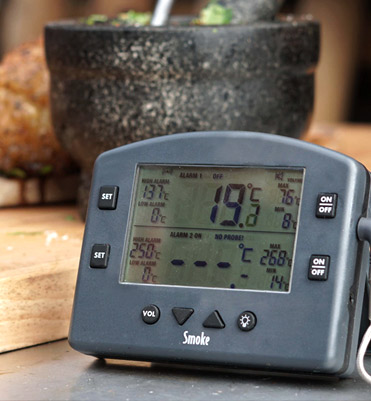
Best wireless meat thermometers
BlueDOT
The BlueDOT is a simple, single-probe Bluetooth thermometer that will allow you to monitor the temperature of one meat from your smartphone. It has a Bluetooth range of 25 metres, so you can relax on the sofa while your Sunday lunch roasts, and wait for a notification on your device once it's cooked. Simple to use and priced at just £72, this is the ideal device for starting your smart thermometer journey.
Smoke
The Smoke thermometer comes with two probes; one for your meat and one for your pit. Instead of connecting to a smartphone app, it comes with a pre-paired wireless receiver. This means there's no setup required and no app to download, so you can start tracking your wireless temperatures instantly. The receiver keeps you updated on the progress of both probe temperatures, but without having to worry about getting your smartphone dirty if you're continuing to cook as you monitor. Its huge radio frequency range of over 90m means you can comfortably roam around the house and garden without losing connection.
Signals
The Signals is the ultimate meat thermometer for big BBQ feasts. With four probes, you can monitor your pit temperature and up to three different meats at once. The Signals thermometer connects to your phone using Bluetooth and Wi-Fi, switching between the two for a seamless connection whether you're at home or across town.
The Signals is also compatible with Billows, a temperature control fan designed to maintain a steady pit temperature. This is ideal for low and slow cooks as you won’t have to fiddle with air vents when your temperature falls out of range.
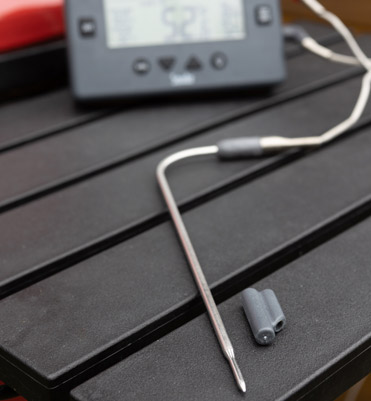
Looking at the benefits of wireless thermometers with wired probes suggests that they have a lot of valuable features. Wide temperature ranges and multiple probe options make them appropriate for a large range of cooks, while the visual display and increased Bluetooth range give greater flexibility for different cooking needs. If you’re looking for a robust and reliable way to monitor your cooks, wired probes are a great way to go.







